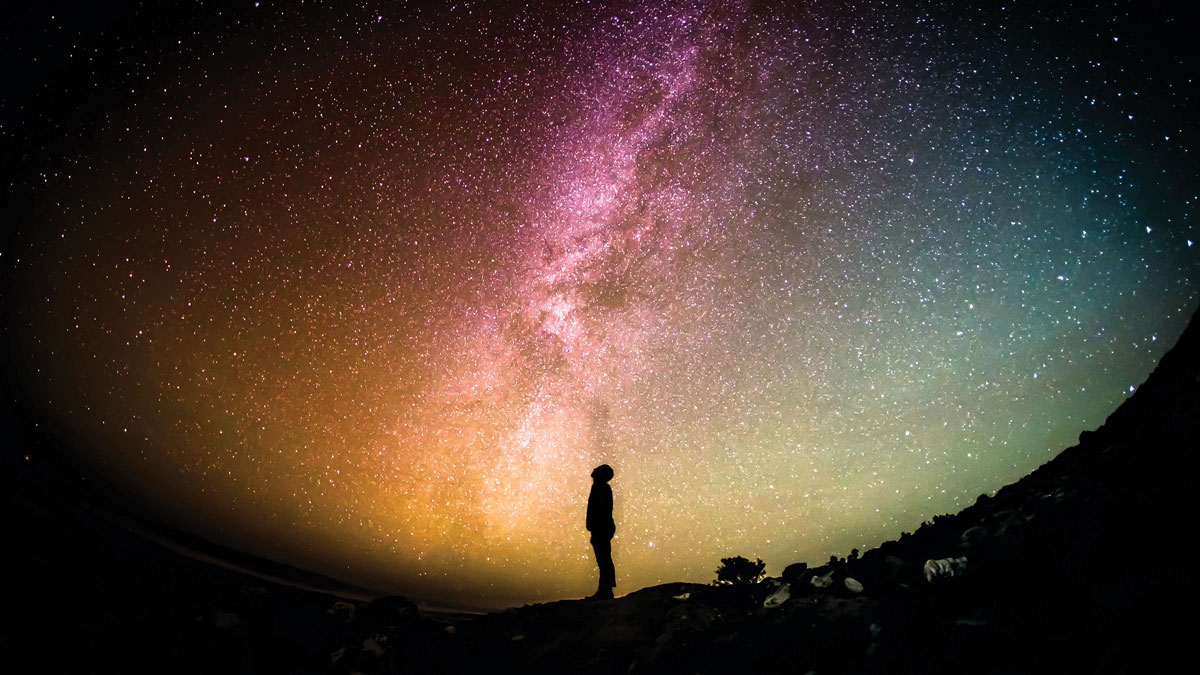Louie Giglio said “sin has a way of shrinking God down in our minds, and puffing us up in our own estimation”. To combat that thinking, he recommends we walk outside at night and look up.
“In the beginning God created the heavens and the earth” (Genesis 1:1). Psalm 19 says “the heavens declare the glory of God. . .” while Psalm 33 says “by the word of the Lord were the heavens made, their starry host by the breath of His mouth”.
So I thought I’d share a little bit about the universe. The universe is often measured in light years. A light year is calculated as the distance light travels in one year. Light travels at 300,000km per second. So a light year in kilometres is 9.46 trillion. If you are not sure what a trillion is, it’s 1000 billion.
Our galaxy, the Milky Way, apparently contains somewhere between 100 and 400 billion stars, and is around 100,000 light years in diameter. Remember a light year is 9.46 trillion kilometres. Sounds pretty big doesn’t it? Well . . .
Astronomers have in the last couple of years discovered Alcyoneus, a giant radio galaxy. (I started to read what that is and then my eyes glazed over and I move on.) Anyway, this galaxy is 16.3 million light years in diameter and 3 billion light years away from Earth. Calculating that in kilometres is a number that makes my brain hurt so let’s just say that it’s a really big galaxy, that’s a really long way away . . . the biggest galaxy known so far.
As for the furthest away . . . In 2011 the Hubble Space Telescope discovered the most distant galaxy ever seen, about 13.2 billion light years from Earth.
In the observable universe, there are billions of galaxies, most of which are 3000 to 300,000 light years in diameter.
I actually Googled how many stars there are in the universe.
Using the Milky Way as our model, we can multiply the number of stars in a typical galaxy (100 billion) by the number of galaxies in the known universe (2 trillion). So, there are approximately 200 billion trillion stars in the observable universe.
Isaiah 40:26 says, “Lift your eyes and look to the heavens: Who created all these? He who brings out the starry host one by one, and calls them each by name. Because of His great power and mighty strength, not one of them is missing.”
200 billion trillion stars—give or take—and He knows each of them by name! And not one of them is missing?
In contemplating the vastness of our universe, we can’t help but ponder the awesomeness of God, who created it.
No-one knows exactly how big the universe is. Scientists estimate that it contains hundreds of billions of galaxies, and that the average galaxy contains hundreds of billions of stars.
Given that we accept the universe is indeed God’s creation, then it seems logical it would be created in a way that reflects His magnitude.
Indeed, the universe is so massive we struggle to comprehend its size. Perhaps this was done so God’s eternal power and divine nature could be understood from the things He created. In other words, so we could get a glimpse of just how immense God is.
As the focal point of God’s creation, humanity physically occupies only a tiny bit of space. Our planet orbits 149 million kilometres away from a single star, the Sun, which is so large that more than one million Earths could fit inside it. Yet our Sun is, at most, a medium-sized star. The largest stars can fit more than three billion of our suns or four quadrillion Earths (that is a four followed by 15 zeros) inside their volumes.
Sometimes in a universe this immense, it can be easy to feel small and insignificant. Yet the Christian faith offers a different perspective.
Speaking to God, the psalmist wrote, “When I consider your heavens, the work of your fingers, the moon and the stars, which you have set in place, what is man that you are mindful of him, the son of man that you care for him?” As he contemplated the vastness of God’s creation, he was amazed that God cares about humanity.
God didn’t craft the universe to make us feel insignificant. He did it to display His power and show His infinite love. It is not about how small we are, but how big He is.
He is a God powerful enough to create worlds, yet detailed and thoughtful enough to knit each of us together in our mothers’ wombs. He is intimately involved in even the tiniest aspect of creating life.
God is so huge He is not bound by time or space, not needing or wanting for anything, and capable of creating our entire universe. Yet He is personal enough to have created us in His own image.
So, amidst the inconceivable size of the universe is this tiny, weeny speck called Earth, on which there are currently more than eight billion people—and the awesome God who created the universe and holds the heavens in the palm of His hand knows your name. He hears your prayers, especially the ones you don’t say out loud. He feels your pain and He delights in your joy. He even knows the number of hairs on your head, and that changes every day, every time you brush or wash your hair. He calls you His sons and daughters—and He thought you were worth dying for.
Gayle Fehlberg is the administrative assistant to Literature Ministry coordinator AU/NZ at Adventist Media.






